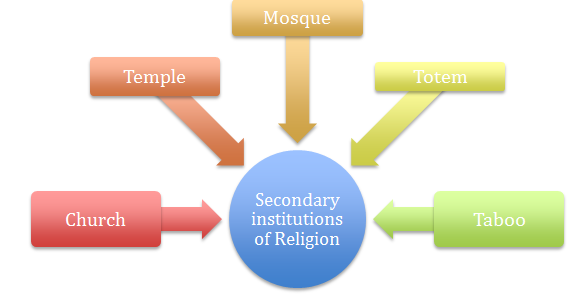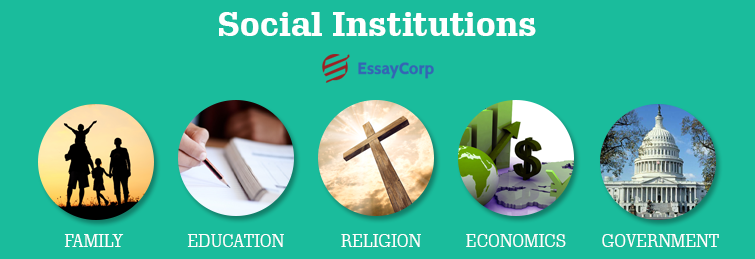Imagine a bustling city, filled with people going about their daily lives. What makes this city function, what shapes its culture and norms? The answer is societal institutions, the invisible frameworks that guide and structure human behavior. From the schools that educate children to the courts that enforce laws, these institutions are the bedrock of any society. Without them, our world would be chaotic and unpredictable.

Image: cloudshareinfo.blogspot.com
This article will delve deeper into what constitutes a societal institution, exploring its history, different types, and its impact on our lives. We will also examine how these institutions are evolving in the modern world and how they interact with each other to maintain societal order.
Understanding Societal Institutions: The Framework of Society
Societal institutions are complex and dynamic entities that play a crucial role in shaping our lives. They are established systems of social behavior that govern our interactions, dictate our expectations, and influence our beliefs and values. In essence, societal institutions provide the structure and guidelines for how we live, work, and interact with one another.
Each institution has a set of values, norms, and rules that define its purpose and operation. These institutions are often intertwined, with actions in one domain having consequences in another. For example, the institution of education provides individuals with the knowledge and skills needed to participate in the workforce, effectively influencing the institution of the economy.
Types of Societal Institutions
Societal institutions can be categorized into various types, each serving a distinct purpose within society.
- Family: The primary unit of socialization, responsible for transmitting values, beliefs, and social skills to its members.
- Education: Institutions that aim to train individuals in various skills and knowledge, preparing them for future roles in society.
- Religion: Organized systems of beliefs and practices that often provide moral guidance, a sense of community, and spiritual fulfillment.
- Economy: The system of production, distribution, and consumption of goods and services that drives societal growth and prosperity.
- Government: The body that establishes laws, enforces rules, and manages public affairs, ensuring social order and security.
- Healthcare: Institutions responsible for providing medical services and promoting public health, safeguarding the well-being of individuals.
- Media: Channels of communication that disseminate information and shape public opinion, influencing cultural trends and social discourse.
The Evolution of Societal Institutions
Societal institutions are not static entities but rather adapt and evolve over time in response to changing social, economic, and technological conditions. The family structure, for instance, has undergone significant transformations in recent decades, with more single-parent households and dual-income families becoming prevalent. The rise of the internet and social media has also profoundly impacted the institution of media, creating new avenues for information dissemination and communication.
These shifts often spark debates and discussions about the effectiveness of existing institutions and the need for reform or adaptation. For example, the traditional education system is facing challenges in adapting to the rapidly evolving demands of the digital age. The role of government in managing economic crises, environmental issues, and global challenges is also subject to ongoing scrutiny and debate.

Image: www.essaycorp.com
Challenges and Opportunities for Societal Institutions
Societal institutions are currently grappling with a complex array of challenges that demand innovative solutions and adaptive strategies.
Challenges:
- Social Inequality: Persistent disparities in wealth, access to resources, and opportunity create social tensions and undermine societal stability.
- Technological Disruption: Rapid advancements in technology are transforming the nature of work, communication, and social interactions, creating both opportunities and challenges for established institutions.
- Globalization: Interconnectedness and interdependence between nations raise complex issues regarding governance, cultural exchange, and economic integration.
- Climate Change: The growing threat of climate change requires collaborative efforts and adaptive strategies from governments, businesses, and communities.
Opportunities:
- Innovation and Technology: New technologies can be leveraged to promote efficiency, enhance inclusivity, and address social challenges.
- Collaboration and Partnerships: Inter-institutional collaboration and partnerships can foster innovative solutions and address complex global problems.
- Empowerment and Participation: Empowering individuals and communities to actively participate in shaping their societies can lead to more responsive and sustainable institutions.
Expert Advice for Navigating the Evolving Landscape
As societal institutions continue to evolve, it is essential for individuals and organizations to remain informed and engage actively in shaping their future.
Tips:
- Stay Informed: Stay updated on current trends, developments, and challenges facing institutions relevant to your interests.
- Engage in Dialogue: Participate in discussions, events, and forums related to institutional reform and societal change.
- Support Organizations: Contribute to or volunteer with organizations working to address challenges and promote positive change within institutions.
- Advocate for Reform: Voice your perspectives on how institutions can be improved and more effectively address societal needs.
The insights shared above provide a framework for understanding the role and impact of societal institutions in our lives. By staying engaged and informed, we can contribute to shaping institutions that better serve the needs of individuals, communities, and society as a whole.
Frequently Asked Questions (FAQs)
What are some examples of societal institutions?
Examples of societal institutions include education, healthcare, government, family, religion, and the economy. These diverse institutions collectively shape our societal norms, values, and interactions.
How do societal institutions influence our daily lives?
Societal institutions influence our daily lives by establishing rules, norms, and expectations that guide our behavior. For instance, the institution of education shapes our knowledge and skills, while the institution of family provides a foundation for our social development.
Are societal institutions always beneficial?
While societal institutions aim to promote order and well-being, they can sometimes be subject to biases, inequalities, or inefficiencies. Critical examination, dialogue, and reform are essential to ensure that institutions are responsive to evolving societal needs.
What Is A Societal Institution
Conclusion
Societal institutions are the backbone of society, providing structure, order, and guidance. Understanding their role, evolution, and challenges is crucial for navigating the complexities of our interconnected world. By staying informed, engaging in dialogue, and contributing to positive change, we can help shape institutions that better serve the needs of all.
Are you interested in learning more about specific societal institutions or their impact on your community? Share your thoughts and questions in the comments below.





